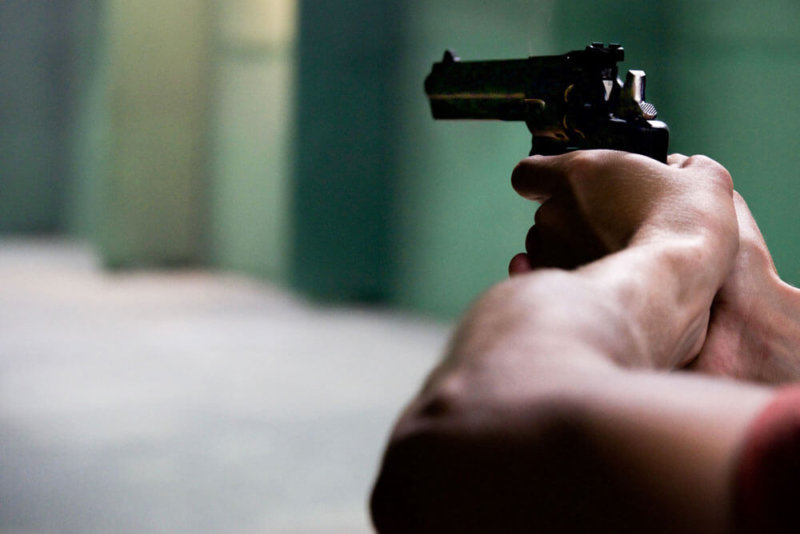Guns or butter?
About the time that Daddy left to fight the big war
I saw my first pistol in the general store
In the general store, when I was thirteen
I thought it was the finest thing I ever had seen
So I asked if I could have one someday when I grew up
Mama dropped a dozen eggs, she really blew up
She really blew up, and she didn’t understand
Mama said the pistol is the devil’s right hand
~ The Devil’s Right Hand, Steve Earle
Two articles in New York Times issues near the end of last month caught my eye. One happened to be in the sports section; the other was a column by writer Roger Cohen.
 The focus of the sports article was on Alabama University football coach Nick Saban’s positive test for the corona virus. However, it was the half-page picture of Saban and two policemen walking down an empty hallway, probably in a hospital, that caught my attention. What police carrying guns have to do with coaches and, in this instance, medical issues, connect only in ways that make me think we feel bound to believe games and wars are one and the same. Protect the generals, right? I wonder why we do this every time I watch a college sports event with the police covering the coaches as though there were a foreign terrorist waiting in the stands to blow them away. My feeling, however, is that it is more an image than a reality, and it portrays where sports have gone—away from games and into war in a way we would like to remember it with soldiers in uniform on the battle field carrying out “plays” that they hope will defeat the enemy and with generals on the sidelines guarded by armed militia. Who could build a clearer image?
The focus of the sports article was on Alabama University football coach Nick Saban’s positive test for the corona virus. However, it was the half-page picture of Saban and two policemen walking down an empty hallway, probably in a hospital, that caught my attention. What police carrying guns have to do with coaches and, in this instance, medical issues, connect only in ways that make me think we feel bound to believe games and wars are one and the same. Protect the generals, right? I wonder why we do this every time I watch a college sports event with the police covering the coaches as though there were a foreign terrorist waiting in the stands to blow them away. My feeling, however, is that it is more an image than a reality, and it portrays where sports have gone—away from games and into war in a way we would like to remember it with soldiers in uniform on the battle field carrying out “plays” that they hope will defeat the enemy and with generals on the sidelines guarded by armed militia. Who could build a clearer image?
The other article was titled “Freedom as the Muzzle of a Glock,” written by Roger Cohen about his trip to the Shooters Grill in Rifle, Colorado. You tell me what the culture of this small burgh is based on and what symbolizes both town residents and the bar’s patrons—yup, with loaded holsters. Cohen says it’s about “preserving American self-reliance—the God-fearing, straight-talking and gun-toting head of the frontier.”
Of course, the author then goes on to place Rifle in the context of our current political state of affairs. He wonders why, in fact, the party of the right is called “Republican” when they do not want this country ruled as a “republic” because for most of the Grill’s patrons, the right to carry guns is a human right based on an individual’s choice, not that of a government (a republic).
Cohen’s evening in Rifle ended when a waitress at the Grill, her guns holstered, said the bar’s owner wanted him out—not on any particular grounds—“She just wants you out.” Cohen, in turn, says “So much for freedom.”
Besides Rifle, Colorado, and the New York Times sports section, the small southwestern hill town of West Pawlet, Vermont, was found by VTDigger to have stashes of weapons and ammunition that a group of militia uses to carry out paramilitary-style training and “professional gun fighting.” The owner of the property calls it the Slate Ridge Center and has been using it for that purpose for the past three years, attempting to gain a permit for it as a “school.” The town denied his request, and he has not been able to obtain an Act 250 permit.
The Pawlet residents who live on land that abuts the “training” property felt they were in physical danger as they hunt in the area. They carry weapons themselves but use them for hunting game, not for teaching basic military manners, as does the Slate Ridge Center.
The Vermont State Militia, based in White River Junction, just across the state from Pawlet, dedicates itself to “defending the Vermont Constitution, which carries a provision protecting the right to bear arms for self-defense and the state.” The Pawlet training group does not claim to be a militia, however. The owner, rather, says its mission is educational and uses its “gun range” as a part of its curriculum.
Apparently, language matters as well as weapons control.
So guns seem to be the mitigating factor for a number of foregone conclusions about elements of our culture. From my point of view, this culture has, in too many derivations, carved itself in a military pattern. Rather than enhance a gun-toter’s job in the variety of ways we now do, let’s look again at the Woodstock generation’s plea and, maybe to the late singer John Prine who lived in Paradise, Kentucky, and would travel down the Green River near Airdrie Hill:
Where the air smelled like snakes and we’d shoot with our pistols,
But empty pop bottles was all we would kill.

